
TROPICAL ECOLOGY
metrics 2024
Illuminating the Path to Sustainable Tropical Development
Introduction
Tropical Ecology is a distinguished journal published by SpringerNature that has been at the forefront of advancing the field of ecology since its inception. With a focus on tropical ecosystems, it addresses critical areas such as conservation biology, systematics, and environmental science. The journal is indexed within leading databases and enjoys a respectable impact factor, ranking in the second quartile (Q2) in Ecology as well as in Plant Science, and third quartile (Q3) in Ecology, Evolution, Behavior and Systematics for 2023. Its insightful research contributions place it among the top-tier publications in Agricultural and Biological Sciences, specifically in rankings such as #185 in Plant Science and #178 in Ecology. While it currently operates under subscription access, it remains an essential resource for researchers, professionals, and students interested in the dynamics of tropical environments, fostering a greater understanding of ecological principles and practices that are pivotal for sustainable development. The journal operates with continuous publication from 1976 to 2024, ensuring timely dissemination of impactful research findings that contribute to the global body of knowledge.
Metrics 2024
 0.40
0.40 1.10
1.10 1.50
1.50 43
43Metrics History
Rank 2024
Scopus
IF (Web Of Science)
JCI (Web Of Science)
Quartile History
Similar Journals
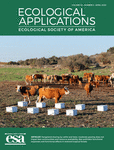
ECOLOGICAL APPLICATIONS
Advancing ecological understanding for a sustainable future.ECOLOGICAL APPLICATIONS, published by WILEY, is a leading journal in the field of ecology, providing a platform for innovative research that addresses the understanding and management of ecological systems. With an ISSN of 1051-0761 and E-ISSN of 1939-5582, it has established itself as a vital resource for ecologists and environmental scientists since its inception in 1991. Ranked in the top quartile (Q1) for Ecology in 2023 and with a Scopus ranking of 40 out of 461 in Environmental Science, ECOLOGICAL APPLICATIONS boasts an impressive impact factor, attesting to its significance and influence in the field. The journal's mission is to publish peer-reviewed articles that contribute to ecological theory and its applications in conservation and environmental management. Researchers, professionals, and students alike will find invaluable insights and the latest developments in ecological research through its comprehensive scope and rigorous scholarship, ensuring a crucial role in shaping future ecological practices and policies.

Tropics
Driving innovation in understanding tropical ecosystems.Tropics, published by the Japan Society for Tropical Ecology, is a prominent journal dedicated to advancing the field of tropical ecology, conservation, and environmental science. With an ISSN of 0917-415X and E-ISSN of 1882-5729, this journal has become a vital resource for researchers, professionals, and students interested in the intricate dynamics of tropical ecosystems. Although it operates as a non-open access publication, it continues to foster academic discourse and collaboration, evident from its various Scopus rankings across categories such as Environmental Science and Agricultural and Biological Sciences. As of 2023, Tropics stands resilient in its mission, providing invaluable insights, promoting sustainable practices, and addressing pressing ecological challenges within tropical environments. The journal’s contributions have been acknowledged since its inception in 1997, making it an essential part of the scientific literature landscape and a key player in supporting tropical ecological research.

Global Ecology and Conservation
Unlocking insights for a thriving planet.Global Ecology and Conservation, published by Elsevier, stands as a premier open-access journal dedicated to advancing the field of ecology and conservation science. Since its inception in 2014, the journal has facilitated the dissemination of high-quality research, fostering critical dialogue on ecosystem management, biodiversity preservation, and sustainability practices across the globe. With a remarkable ranking within the top quartiles (Q1) in various categories including Ecology, Evolution, Behavior and Systematics, and Nature and Landscape Conservation, it is positioned among the leading resources for researchers and professionals alike. The journal has garnered a notable impact, ranking #65 out of 721 in Ecology, and houses articles that are vital to understanding and addressing the pressing environmental challenges of our time. Available in an open-access format, researchers can freely access and share vital findings, promoting a collaborative approach to ecological research. Global Ecology and Conservation is not just a publication; it is a critical tool for innovation and advocacy in conservation, poised to inspire the next generation of environmental stewards.
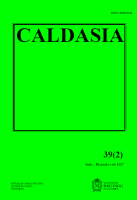
CALDASIA
Advancing Agricultural Insights for a Sustainable FutureCALDASIA is a distinguished open-access journal dedicated to the field of Agricultural and Biological Sciences, published by INST CIENCIAS NATURALES, MUSEO HISTORIA NATURAL since its inception in 1981. Based in Colombia, this journal plays a pivotal role in disseminating scientific knowledge and fostering research collaboration across the globe. With a focus on diverse subjects within the biological sciences, CALDASIA aims to bridge gaps in research and support scholars, professionals, and students in advancing their work. With a 2023 Scopus Ranking of #132 out of 221 in its category, representing a 40th percentile ranking, it holds a solid position in the academic community, particularly recognized for its contributions to miscellaneous areas within agricultural and biological sciences. The journal remains committed to enhancing accessibility, as evidenced by its open-access policy since 2001, thereby ensuring that research findings reach a wider audience without barriers. For those returning to this vibrant field, CALDASIA serves as an essential resource for contemporary findings and discussions that shape environmental and biological scholarship.
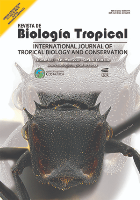
REVISTA DE BIOLOGIA TROPICAL
Illuminating the path to conservation and sustainability.REVISTA DE BIOLOGIA TROPICAL is a prominent scholarly journal published by the Universidad de Costa Rica that serves as a vital platform for research in the realms of agricultural and biological sciences. Established in 1969, the journal has evolved into a crucial resource, contributing significantly to the understanding of tropical ecosystems and biodiversity. With its current classification in the Q2 quartile for Agricultural and Biological Sciences, it ranks #109 out of 221 journals in its category, reflecting its esteemed position within the academic community. Although it operates under traditional access guidelines, the journal remains committed to disseminating high-quality research that informs conservation efforts and sustainable practices in tropical biology. The journal's diverse scope encompasses a wide range of topics, ensuring relevance for professionals, researchers, and students dedicated to enhancing knowledge and innovation in the biological sciences. As the journal progresses towards 2024, it continues to invite contributions that advance scientific discourse and foster collaboration within the field.
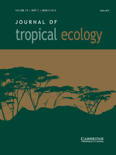
JOURNAL OF TROPICAL ECOLOGY
Exploring the Rich Tapestry of Tropical EcosystemsThe JOURNAL OF TROPICAL ECOLOGY, published by Cambridge University Press, serves as a pivotal platform for advancing knowledge in the field of ecology, particularly within tropical environments. With an ISSN of 0266-4674 and an E-ISSN of 1469-7831, this esteemed journal has been a key resource since its inception in 1985, maintaining a focus on empirical research that addresses the complexities of tropical ecosystems. It holds a respectable Q3 ranking in the Ecology, Evolution, Behavior and Systematics category as of 2023, indicating its significant contribution to the field, although it remains within the competitive mid-range. The journal publishes original research, reviews, and methodological articles that illuminate the rich biodiversity and unique ecological processes of tropical regions, fostering a deeper understanding of conservation challenges. Accessible from the United Kingdom, this publication appeals to a diverse audience of researchers, professionals, and students keen on exploring ecological dynamics in tropical settings, and plays a crucial role in promoting scientific discourse and collaborative efforts aimed at preserving our planet's vital ecosystems.
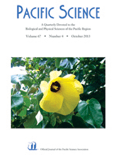
PACIFIC SCIENCE
Advancing Multidisciplinary Insights from the PacificPACIFIC SCIENCE is a prestigious multidisciplinary journal published by University of Hawaii Press, dedicated to advancing knowledge across diverse fields of study related to the Pacific region. With a robust ISSN of 0030-8870 and an E-ISSN of 1534-6188, this journal serves as a vital platform for researchers, professionals, and students to disseminate and access influential research findings that contribute to the understanding of ecological, cultural, and social dynamics in the Pacific. The journal has steadily maintained its relevance since its inception in 1947 and features a commendable Scopus Rank of #74 out of 171 in the multidisciplinarity category, placing it in the 57th percentile of its field, and is recognized as having a Q2 quartile ranking in 2023. Although lacking open access options, PACIFIC SCIENCE offers in-depth analysis and scholarly discourse, effectively bridging various disciplines to foster collaboration and innovation. With its commitment to high-quality research and its significant impact on Pacific studies, the journal continues to play an important role in informing policy, conservation efforts, and community engagement within this vital region.

Ecosistemas
Bridging knowledge and action for ecological resilience.Ecosistemas is a prominent Open Access journal published by the ASOCIACION ESPANOLA ECOLOGIA TERRESTRE, specializing in the field of ecology. Since its inception in 2001, it has dedicated itself to advancing ecological knowledge and research, fostering an inclusive platform for the dissemination of cutting-edge studies that span ecological interactions, sustainability, and biodiversity. The journal, based in Spain, has established its reputation with notable rankings such as Q3 in the field of Ecology and Q4 in Ecology, Evolution, Behavior, and Systematics, reflecting its commitment to quality research. With a Scopus Ranks position placing it in the 40th and 37th percentiles for its categories, Ecosistemas is integral to the academic community, serving researchers, professionals, and students alike. It provides a vital resource for those seeking to understand ecological dynamics and environmental challenges, facilitating open access to important findings and discussions that shape the future of our ecosystems.
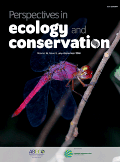
Perspectives in Ecology and Conservation
Innovative insights into conservation challenges and solutions.Perspectives in Ecology and Conservation, published by Elsevier Science Ltd, is a leading academic journal dedicated to advancing the fields of ecology, conservation, and environmental management. With a Q1 ranking in multiple categories, including Ecology, Management, Monitoring, Policy and Law, and Nature and Landscape Conservation, this journal boasts an impressive standing among its peers, making it essential reading for researchers and professionals. Since its inception in 2017 and running through 2024, it aims to provide innovative perspectives and critical analyses that enhance our understanding and practices in conservation science. The journal is accessible through open access options, facilitating broader dissemination of knowledge. Its commitment to addressing contemporary ecological challenges reinforces its importance in the academic community, promoting sustainable practices and informed policy-making in the face of urgent environmental issues.
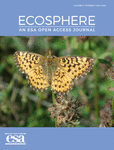
Ecosphere
Unveiling the dynamics of ecosystems through open access.Ecosphere is a leading open-access journal published by WILEY, dedicated to advancing research in the fields of ecology, evolution, behavior, and systematics. Established in 2010 and headquartered in the United States, this innovative journal provides a platform for the exchange of cutting-edge scientific knowledge and discovery, fulfilling its mission to enhance our understanding of ecological systems and their interactions. With a prestigious impact factor reflecting its commitment to high-quality research, Ecosphere is ranked Q1 in both Ecology and Ecology, Evolution, Behavior, and Systematics for 2023, further solidifying its prominence in the scientific community. The journal's scope includes a wide array of topics related to environmental science, making it an essential resource for researchers, professionals, and students aiming to stay at the forefront of ecological research. It offers comprehensive open access options, ensuring that groundbreaking findings are readily available to a global audience, thus fostering collaboration and innovation in the field.